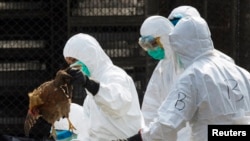BEIJING —
In January, China saw a rise in the number of people diagnosed with bird flu. As the Chinese New Year approaches, millions of people will begin their annual journey home for the holiday, increasing the opportunity for the virus to spread.
A recent outbreak of the H7N9 virus has already killed 19 people in China this year.
Dr. Bernhard Schwartlander, the World Health Organization's representative in China, says crowded train stations and airports typify the annual migration home for the holiday.
“If there are mass movements many people are traveling. The trains are crammed with people. The planes are full. People are running around everywhere. That always bears the risk of transmission of infections,” the doctor explained.
Aside from the risks of contracting the illness while traveling, traditional New Year celebrations in some parts of China include killing live chickens.
To help prevent the spread, live poultry sales have been barred in Shanghai and eastern Zhejiang Province. Officials in Zhejiang have also launched emergency surveillance of farms and stopped the flying of domestic pigeons.
Hong Kong’s health officials are also shutting poultry markets for disinfection and plan to cull 20,000 birds.
In one of the largest annual mass migrations in the world, the Chinese government estimates more than 3.6 billion trips will be taken over the 40 day travel period this year. More than 50 percent of China’s population now lives in cities, but many return to their childhood homes in the countryside for the new year holiday.
In Heifei in eastern China, 17-year-old Fu Anqi says her mother worries about the potential spread of avian flu during the holiday season.
“She kind of had a struggle between protecting ourselves from the flu and seeing our relatives in Beijing,” Fu said.
So far, bird flu has only been transmitted among birds and from birds to humans. The WHO’s Dr. Schwartlander says the virus has not mutated yet to a form where it can spread easily between humans.
“So far there is no evidence of person to person transmission," the doctor noted.
Health officials remain on high alert though this holiday season as the virus continues to circulate and sicken China’s poultry. The H7N9 virus has infected 96 people in China since the disease was first identified in 2013.
A recent outbreak of the H7N9 virus has already killed 19 people in China this year.
Dr. Bernhard Schwartlander, the World Health Organization's representative in China, says crowded train stations and airports typify the annual migration home for the holiday.
“If there are mass movements many people are traveling. The trains are crammed with people. The planes are full. People are running around everywhere. That always bears the risk of transmission of infections,” the doctor explained.
Aside from the risks of contracting the illness while traveling, traditional New Year celebrations in some parts of China include killing live chickens.
To help prevent the spread, live poultry sales have been barred in Shanghai and eastern Zhejiang Province. Officials in Zhejiang have also launched emergency surveillance of farms and stopped the flying of domestic pigeons.
Hong Kong’s health officials are also shutting poultry markets for disinfection and plan to cull 20,000 birds.
In one of the largest annual mass migrations in the world, the Chinese government estimates more than 3.6 billion trips will be taken over the 40 day travel period this year. More than 50 percent of China’s population now lives in cities, but many return to their childhood homes in the countryside for the new year holiday.
In Heifei in eastern China, 17-year-old Fu Anqi says her mother worries about the potential spread of avian flu during the holiday season.
“She kind of had a struggle between protecting ourselves from the flu and seeing our relatives in Beijing,” Fu said.
So far, bird flu has only been transmitted among birds and from birds to humans. The WHO’s Dr. Schwartlander says the virus has not mutated yet to a form where it can spread easily between humans.
“So far there is no evidence of person to person transmission," the doctor noted.
Health officials remain on high alert though this holiday season as the virus continues to circulate and sicken China’s poultry. The H7N9 virus has infected 96 people in China since the disease was first identified in 2013.





